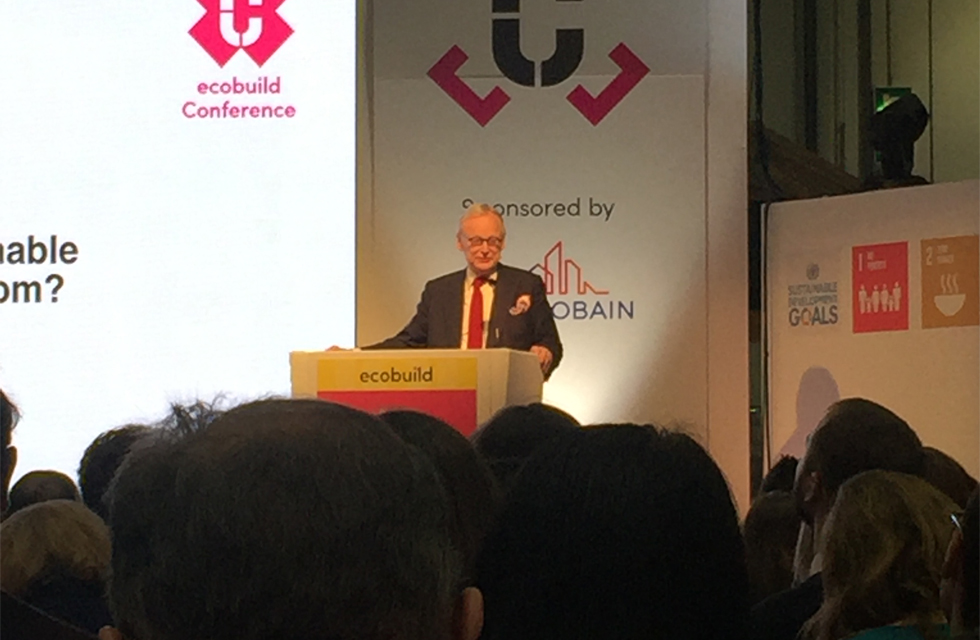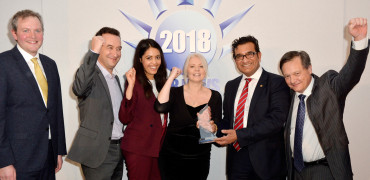If you weren’t able to get to the ExCel Centre in London’s Docklands last week, then you won’t have been able to visit Ecobuild 2018, so did you miss anything major? And what was the overall feeling of the show?
Launched in 2004, Ecobuild quickly established itself as the place to be for anyone aspiring to show off their ‘green’ credentials.
From its early days of composting toilets, cycle sheds and recycling, the show grew into a real showcase of what the construction industry has to offer to help us get to a more sustainable future.
For me, the show has become more of a construction show, rather than a true ‘built environment’ event.
A shadow of its former self
At its height, Ecobuild occupied almost all of both sides of the ExCel Centre and it was almost impossible to do in just one day’s visit. A one point, there was a major area devoted to Photovoltaic systems and all of the major heating manufacturers attended, with huge stands to show off their energy efficient and renewable wares.
This year’s show was confined to just five Halls on the North side of the complex and a quick look at the exhibitor list brings up very few familiar names for the building services sector.
For me, the show has become more of a construction show, rather than a true ‘built environment’ event and this year, there were less than a handful of renewable heating suppliers on display, no Photovoltaic manufacturers and very few big brands in the sector.
An impressive talking shop
That said, Ecobuild still manages to put together a comprehensive seminar programme with an impressive line-up of respected speakers covering topics as diverse as Building a carbon neutral London; Changing behaviour; the economics of housing; air pollution; zero carbon buildings; the circular economy; heat networks and much, much more.
I managed to catch most of a really interesting debate called ‘Behaviour Change for a sustainable future – the elephant in the room’, which tried to tackle the issue of how we engage consumers in the changes needed to get us to a carbon neutral place.
It was chaired by Dr Jane Davidson, the Pro-Vice Chancellor for Sustainability and Engagement and director of INSPIRE at the University of Wales Trinity Saint David.
Change can happen quickly
First up was Andrew Simms, political economist, environmentalist and co-founder of the New Weather Institute. He quoted the UK Met Office as saying that we may be as little as five years away from crossing a major line in terms of climate change.
Mr Simms reported that the country is still 82% dependent on fossil fuels for our energy supply but on the plus side, we know we have the technology, the skills and plans to move to 100% renewables.
Using the example of the Icelandic volcano ‘Eyjafjallajökull’ which erupted in 2010 and caused enormous disruption to air travel across western and northern Europe over an initial period of six days.
Mr Simms felt this showed how behaviour can be changed, and we can adapt quickly if we need to.
The Icelandic volcano overnight changed the way we do things. Flights across Europe were stopped. Society didn’t fail. We adapted and found other ways to carry on as normal.
He felt this was a glimpse of what could happen if we simply took the brave decision to stop all flights.
Responsibility not consumption
His main point was that we need to change the way we communicate with society explaining that at the moment, everyone is targeted as a consumer, NOT an individual citizen with responsibilities.
He explained that on the way to the exhibition, he had conducted a random count of consumer messages targeted at all of us, versus ‘citizen’ messages and it was 500 to 3.
The three were encouraging people to be a responsible citizen: Don’t attack staff on the Tube; don’t run over cyclists; A third appealing for witnesses to a mugging.
So, rather than leaving it to the market to effect change - which means it won't happen quickly enough, we need to examine the messages we push to society and move away from this never ending barrage of ‘consume, consume, consume.’
Mr Simms then recommended that the first thing we all need to do is accept the scale and speed of change necessary and come up with a plan to make it happen.
He ended with a quote from Swedish author, Sven Lindqvist: ““You already know enough. So do I. It is not knowledge we lack. What is missing is the courage to understand what we know and to draw conclusions.”

Hope in the face of the impossible
Following on was Lord Deben, Chair of Climate Change Committee who said he has: “optimism but I prefer to call it hope, because hope is a much more lively and driving force than optimism.”
He saw the Paris Climate Change Agreement as an outpouring of hope, with every nation almost without exception recognising climate change and the need to do something.
However, whilst we all recognise it is a crisis, it is also easy to forget about it and ignore it.
Lord Deben also felt that the people who still deny climate change are in an impossible position but Trump and Brexit show that some do believe in the impossible.
On Brexit, he simply felt that breaking links with those who we need to work with is not understandable.
He referenced the Pope’s encyclical letter urging the world’s 1.2 billion Catholics to join the fight against climate change, calling it a moral issue that must be addressed in order to protect the Earth and everyone on it.
Centuries of unrealistic treatment
Lord Deben felt that climate change is a terrible symptom of what we have done to the world. A symptom of 100’s and 100’s of years of treating the planet and fellow humans in an unrealistic manner.
Calling for global solutions to global problems, he felt that we need to recognise that we are no longer in an imperialist world.
We can’t simply tell countries like India what they have to do whilst others such as the US carry on reaping the benefits. That is why he believes that Trump looks so out of date.
Asking how we can match what we need to do to meet the demands of climate change, Lord Deben suggested we need to make it easier to be good than bad, because if we make things too difficult, then people simply don’t do it.
We have the technology now to make these things happen so that people don’t even need to think about them, so yes, hotel lights that go off automatically, plus other things we can already do.
These may seem small changes but together they all add up.
Housing scandal
He then moved on to what he called the “utter scandal” of house builders only manufacturing a small number of homes because it gives them the best return on investment.
This makes them land bankers rather than housebuilders and he had a simple suggestion on how to solve this. No mortgages should be quoted without including the costs for heating and lighting every month. That would highlight exactly how economic and green these new homes are.
Next he felt that the housebuilders must be forced to build as near to Passivhaus standard as possible: “It does not have to cost more. It’s only expensive at the moment because it is niche, which adds about 10% to the cost, but if all housebuilders do it, then it becomes mass produced and the price comes down.”
Next, people fix the house price according to what they think they can get. If we force them to build better homes in the first place then the price will come out of the land price and this is why the industry will not do it. It affects their profits.
He challenged the major housebuilders saying "yet they dare to pay millions in bonuses and they should not be allowed to". Lord Deben called time restrictions to be placed on any land with planning permission and suggested a new Minister for Housebuilding to monitor this.
Don’t forget retrofit
He ended by moving on to talk about the retrofit sector and helping get rid of people’s fear of renewable and energy saving solutions by challenging the myths out there.
People will save over double what they spend by investing in green measures but you only ever hear about the initial cost of paying for these measures, we don’t hear enough about the savings if we build good homes in the first place.
And on this point of having to bring older properties up to modern standards, Lord Deben felt that building better homes in the first place has the added advantage that we don’t then have to look at going back in 10 or 15 years’ time to retrofit energy improvements to them. These things need to be built-in from day one.
So, all-in-all, was a glad I took the long journey to Ecobuild 2018?
Well I did manage to catch up with several contacts that I don’t get the time to see as regularly as I would like, so as a networking event, it worked for me.
I didn’t see anything radical on display, and I will be interested in seeing who the organisers say attended the show, not just the numbers, but the types of people visiting.
I did enjoy the seminar though and wish I’d had time to see more of them.
Perhaps Ecobuild could now broadcast them online as this would also act as a promotion to highlight one of the most valuable things about attending show.
Russell Jones is Content and Communications Manager for Mitsubishi Electric, Living Environment Systems in the UK.



